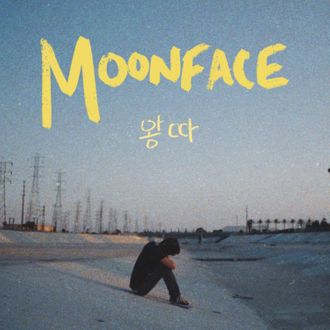
Communication between two people who care about each other but don’t share a language involves a kind of dance. They have to use indirect and opaque ways to transfer meaning, and whatever few words they may share are often stretched far beyond their capacity. Such interactions are hopelessly imprecise, and because of that imprecision, trust is required. Because neither side can truly know what the other is trying to say, they just have to assume the important stuff — that, at the end of the day, they do indeed care.
This is a dance familiar to immigrants and first-generation types living in multicultural contexts, and it’s a central concern of Moonface, the gorgeous debut fiction podcast from James Kim.
Moonface presents a specific moment in the life of Paul, played by the actor-comedian Joel Kim Booster. We encounter Paul, a first-generation immigrant and a gay man, as he navigates a hazy in-between phase of adulthood. Spending his days waiting tables, hanging out with friends, and considering a creative vocation, Kim’s protagonist is unsure of where his life is going. He lives at home in the Greater L.A. area with his mother, whom he loves; he has yet to come out to her. Though they share the same roof, the two couldn’t be further apart. She doesn’t speak English very well; his Korean is paltry. Despite warm attempts to connect over meals and during the flow of everyday life, the logistics are what they are, and they remain a mystery to each other.
This distance informs, and is reflected throughout, other parts of Paul’s life. He grapples with his ethnicity, his desires, and where those things fit within the context of who he is. Paul’s parallel journeys to find himself and his mother make up the arc of the story’s concerns. It’s a rich ball of interior struggle to unspool.
Taking place over six brisk episodes, Moonface offers a compellingly different aural take on the “coming-of-age in Los Angeles” tale. The bulk of this has to do with the strength of the scenes shared by Booster and Esther Moon, who plays Paul’s mother. Grounded in the stutter step of searching bilingual conversations, those scenes project a naturalistic feel that’s somewhat uncommon in fiction podcasts, a genre that is often heavy on theatrical styles of performance. There’s a lot being done in the silences between those two characters. It’s painful, and often quite beautiful.
The podcast leans hard into the linguistic context of its main character, presenting it as a given. You get no subtitles with podcasts, and thus you’re placed in Paul’s shoes as he works to connect with his mother’s Korean peppered with bits of English. Assuming you’re not fluent in Korean, his struggle is your struggle, his want is your want. This emphatic enterprise links Moonface to a thread originally spun by Kaitlin Prest’s The Shadows from last year. Indeed, Prest gets name-checked at one point in Moonface, which openly wears its influences on its sleeve … to mixed effect. Both projects use the fiction-podcast genre, and its ability to conjure worlds in the mind’s eye, to build unique dynamics between people. In the case of The Shadows, it’s the turbulence of a rise-and-fall relationship between two bohemian artist types. Here, it’s the fraught coming together of a mother and son separated by a universe of language and culture.
Moonface is quite effective in that portrayal. That has a lot to do with how the podcast works to collapse the space between Paul and the listener, via a dazzling array of design choices. Much credit should be given to the splendid sound design by Artin Aroutounians, whose work produces a dreamlike sonic aesthetic that goes a long way in amplifying the emotional intensity of every scene. The show is also boosted by a shrewd use of music, split between original compositions by Oyster Kids’ Andrew Eapen, rich with the acidic drips of the contemporary Los Angeles sound, and an intriguing use of licensed tracks from artists like Clairo and Big Thief. All this comes together to create a fiction-podcast experience that feels distinctly modern and forward-looking.
There are stumbles, and they stand out. Moonface can get really rough around the edges and is sometimes prone to clunky writing, and there are a few uninspiring performances in scenes that don’t feature Paul and his mother. Furthermore, despite its relatively radical subject matter, the plotting ultimately ends up being fairly conventional, which is a bit of a bummer. For some, though, the biggest hitch could be the way Moonface attends to its podcast influences. A driving element of the story involves Paul, in search of a creative life, signing up for and taking a podcast workshop. Those sequences in particular feature a good deal of name-checking that comes off as a performative box-ticking of influences.
All things considered, though, those hitches are fairly minor. They certainly don’t undercut Moonface’s intense highs. When it hits its stride, the show is capable of going to some genuinely striking emotional places. Thoughtful, vivid, and adventurous, James Kim’s debut fiction podcast is a remarkable addition to the flowering genre. By the end of the whole thing, you’ll feel like you’ve had a glimpse of the raw intensity that this medium, and this style of storytelling, can offer.


